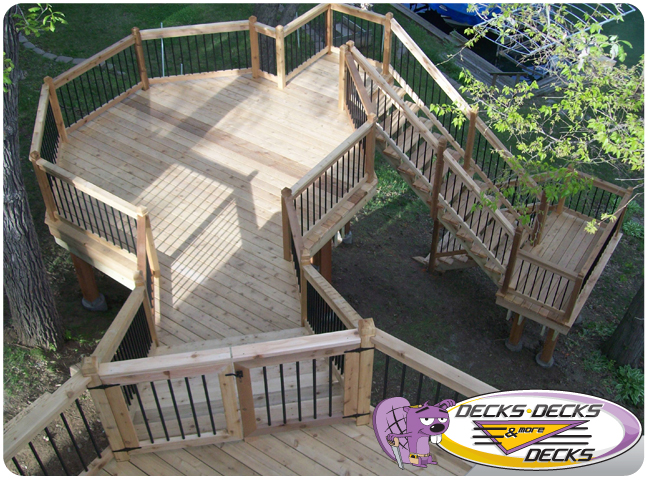Pressure-Treated Wood vs. Cedar Wood Decking for the Weather in Omaha, NE
When choosing decking materials for your Omaha home, considering the local climate is crucial. Omaha experiences a range of weather conditions, including hot summers, cold winters, and varying humidity levels. Two popular options for decking are pressure-treated wood and cedar wood, each with its own set of benefits and drawbacks. Here’s a comparison to help you decide which material is better suited for the weather in Omaha, NE.
Pressure-Treated Wood
What Is Pressure-Treated Wood? Pressure-treated wood is lumber that has been treated with a chemical preservative to resist decay, insects, and moisture. It’s commonly used for decking due to its durability and affordability.
Advantages:
- Durability: Pressure-treated wood is designed to withstand harsh weather conditions, including moisture and pests. It’s treated to resist rot and insects, making it a long-lasting option for Omaha’s varied climate.
- Cost-Effective: Typically less expensive than cedar, pressure-treated wood offers a budget-friendly solution for decking projects.
- Low Maintenance: While it still requires periodic sealing and cleaning, pressure-treated wood generally demands less maintenance compared to some other materials.
Disadvantages:
- Aesthetic Appeal: Pressure-treated wood often has a greenish or brownish tint from the chemicals used in the treatment process. It may not offer the same natural beauty as cedar.
- Temperature Sensitivity: Pressure-treated wood can become hot to the touch in summer and may warp or crack if not properly maintained.
Cedar Wood
What Is Cedar Wood? Cedar wood is a naturally occurring, softwood known for its beautiful appearance and natural resistance to decay and insects. It’s a popular choice for decking due to its aesthetic appeal and durability.
Advantages:
- Aesthetic Appeal: Cedar has a rich, warm color and a pleasant aroma. Its natural beauty adds a high-end look to your deck and can enhance the overall appearance of your outdoor space.
- Natural Resistance: Cedar wood naturally resists decay, insects, and moisture to some extent, making it a good option for Omaha’s weather. It’s less prone to warping and cracking compared to some other woods.
- Thermal Performance: Cedar tends to stay cooler underfoot in hot weather compared to pressure-treated wood, making it more comfortable in summer.
Disadvantages:
- Cost: Cedar is generally more expensive than pressure-treated wood, which can be a consideration for budget-conscious projects.
- Maintenance: Cedar requires regular maintenance to preserve its color and prevent weathering. It should be sealed and cleaned periodically to maintain its appearance and longevity.

Performance in Omaha’s Weather
1. Summer Heat:
- Pressure-Treated Wood: Can become hot to the touch during peak summer temperatures, potentially making it uncomfortable for barefoot use.
- Cedar Wood: Generally remains cooler underfoot in hot weather, providing a more comfortable surface for outdoor activities.
2. Winter Cold:
- Pressure-Treated Wood: Handles cold temperatures well, but can become brittle if not properly maintained.
- Cedar Wood: Cedar performs well in cold weather and is less likely to suffer from severe temperature fluctuations compared to some other woods.
3. Moisture and Humidity:
- Pressure-Treated Wood: Excellent at resisting moisture and humidity due to the chemical treatment, which helps prevent rot and mold.
- Cedar Wood: Naturally resists moisture and insects but requires regular sealing to maintain its protective properties and prevent damage from high humidity.
Conclusion
Both pressure-treated wood and cedar wood offer distinct advantages for decking in Omaha’s climate. Pressure-treated wood is cost-effective, durable, and resistant to moisture, making it a practical choice for those on a budget. Cedar wood, on the other hand, provides natural beauty, a cooler surface in summer, and good performance in cold weather, though it comes with a higher price tag and requires more maintenance.
When choosing between the two, consider your budget, aesthetic preferences, and willingness to maintain your deck. Both options can be excellent choices for Omaha’s weather, provided you take care of them properly.
Check Out This Blog!

